Coffee is more than just a morning pick-me-up. For many, it’s a passion, a craft, and even an art form. Yet, when exploring the world of coffee, one term often stands out as a mark of quality: “specialty coffee.” But how does specialty coffee truly differ from the traditional coffee we’ve known for decades? This article dives deep into the characteristics, origins, production, and tasting experiences that set these two coffee worlds apart.
What Is Traditional Coffee?
Traditional coffee refers to the mass-produced coffee that most people are familiar with—what you commonly find in grocery stores, diners, and office break rooms. It is typically made using commodity-grade beans and often emphasizes quantity over quality.
Key Characteristics of Traditional Coffee:
- Lower-grade beans: These coffees generally score below 80 on the Specialty Coffee Association’s (SCA) 100-point scale.
- Mass production: The focus is on producing large volumes at low costs.
- Inconsistent quality: Due to blending beans from various sources and processing in bulk, taste and aroma can vary significantly from batch to batch.
- Pre-ground packaging: Most traditional coffees are sold already ground, reducing freshness over time.
- Roast profile: Traditional coffee often uses darker roasts to mask defects and create a uniform flavor.
What Is Specialty Coffee?
Specialty coffee is defined by quality at every stage of its journey—from farm to cup. According to the SCA, coffee must score 80 or above out of 100 in a formal cupping evaluation to be considered “specialty.” This level of coffee places great emphasis on flavor, sustainability, traceability, and care in every part of the process.
Defining Traits of Specialty Coffee:
- High-quality beans: Specialty beans are typically Arabica and come from specific microclimates, where they are carefully cultivated.
- Single origin: These coffees often come from one country, region, or even a single farm.
- Rigorous evaluation: Beans are evaluated by trained professionals known as Q Graders for aroma, flavor, acidity, body, and balance.
- Ethical and sustainable sourcing: Farmers are paid fair prices, and practices aim to protect the environment.
- Fresh roasting and grinding: Most specialty coffee is roasted in small batches and ground fresh to order, ensuring peak flavor.
Farming and Sourcing Differences
Traditional Coffee:
- Sourced through large brokers with less transparency.
- Focuses on yield rather than quality.
- Often grown with the use of pesticides and fertilizers to maximize production.
- Less attention to social and environmental impact.
Specialty Coffee:
- Direct trade or fair trade relationships are common.
- Emphasis on biodiversity, organic methods, and sustainability.
- Farmers are trained in best practices to maintain bean quality and consistency.
- Traceability ensures buyers know where their coffee comes from.
Roasting and Flavor Profiles
The roasting process significantly affects the flavor of coffee, and there are marked differences between specialty and traditional methods.
Traditional Coffee Roasting:
- Often uses dark roasts to achieve consistency and mask flavor flaws.
- Results in bold, bitter, or burnt notes.
- Less focus on highlighting the coffee’s natural flavors.
Specialty Coffee Roasting:
- Uses light to medium roasts to enhance the bean’s unique flavors and origin characteristics.
- Tasting notes may include citrus, chocolate, floral, berry, or nutty undertones.
- Each roast is tailored to the specific bean variety and origin.
Brewing and Serving
Specialty coffee tends to embrace a wide variety of precise brewing methods that enhance flavor complexity, such as pour-over, siphon, AeroPress, and cold brew. Baristas are often trained professionals who understand coffee chemistry, extraction ratios, and temperature control.
Traditional coffee, in contrast, is most often brewed with automatic drip machines or instant methods, emphasizing convenience over quality.
The Consumer Experience
Traditional Coffee Drinkers:
- Often value convenience and price.
- Less focus on flavor depth or origin.
- Most likely to buy in bulk from supermarkets.
Specialty Coffee Drinkers:
- Tend to be more engaged and curious about coffee.
- Enjoy exploring different beans, methods, and flavor notes.
- Often frequent specialty cafes or brew coffee at home with care.
Cost Comparison: Is Specialty Coffee Worth It?
Specialty coffee is typically more expensive than traditional coffee, but the added cost reflects:
- Higher production and processing standards.
- Better compensation for farmers and workers.
- More sustainable and environmentally friendly practices.
- A vastly improved taste experience.
For those who appreciate quality and transparency, specialty coffee is often worth the investment.
Why This Distinction Matters
Understanding the difference between specialty and traditional coffee can elevate your appreciation for what goes into each cup. Choosing specialty coffee supports sustainable farming, ethical practices, and a deeper connection with your beverage.
Whether you’re a casual drinker or an aspiring connoisseur, being mindful of what you’re drinking helps you make more informed and rewarding choices.
Elevating Your Coffee Journey
If you’ve only ever tried traditional coffee, now is the perfect time to explore the specialty world. Even small changes—like switching to freshly ground beans or visiting a local specialty café—can enhance your daily ritual. And with each cup, you’ll start to taste the story behind the brew.
